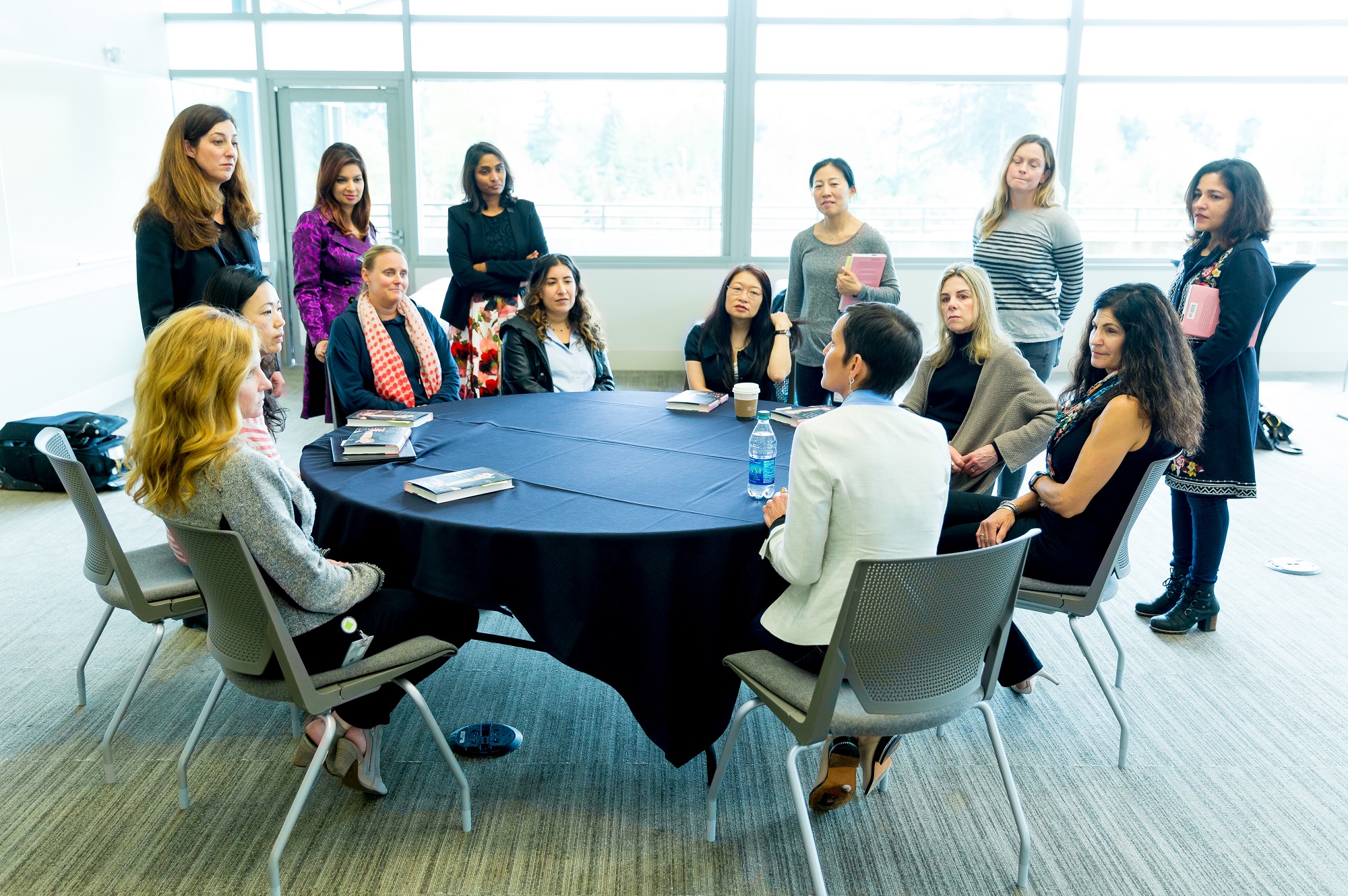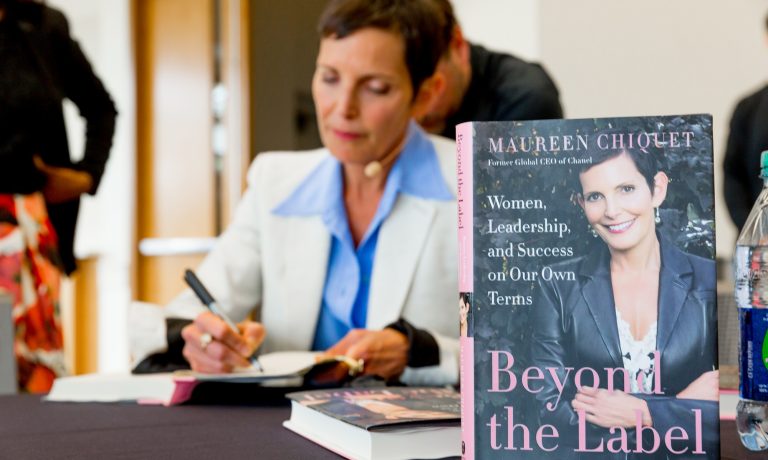Maureen Chiquet, author and former global CEO of Chanel, on finding your own definition of success
In her new book, “Beyond the Label: Women, Leadership and Success on Our Own Terms,” Maureen Chiquet chronicles her unconventional path from literature major to global CEO of Chanel, a position she left in 2016 to focus on developing new leadership initiatives. She describes crucial moments in her career at L’Oréal, The Gap, Old Navy, Banana Republic and Chanel to help others find their own vision of success.
Chiquet’s book tour included a recent talk with employees at Microsoft, where we chatted with her about nontraditional careers, mentorship and motherhood.
Transform: What do you view as traditionally female and male qualities in leadership? How are both important to good leadership and strong organizations?
Maureen Chiquet: The balance of what sociologists call masculine and feminine leadership qualities is critical to any business. Historically, we’ve looked at leadership primarily in what people call a masculine frame, which is embracing things like driving for results, being determined and resolute, and being competitive. All those things are important.
That doesn’t mean women don’t possess those qualities. They do. But women also have intrinsic qualities like empathy and the ability to listen and build collaboration. In today’s world — with the digital revolution, millennials and globalization — listening and being empathetic become really important. We live in a global fish bowl of transparency, so what I’ve noticed is that good leaders embody both sets of qualities.

Transform: You write with honesty about your struggles as a new saleswoman at L’Oréal, a mother, an executive who just got some critical feedback. How important is it for leaders to show vulnerability? What’s the best way for leaders to balance vulnerability and empathy with the confidence and decisiveness required to lead?
Maureen Chiquet: I think it is important to show a certain amount of vulnerability to recognize where you need help and that you don’t know everything, because it builds the trust of teams. But that doesn’t mean you don’t stand your ground when you need to.
I find that it’s a fine balance and circumstantial. Maybe you’re in a meeting and there’s a lot of debate and you have to tow the line. But maybe you say, “I want to hear everybody’s point of view and I don’t know the answers.”
When I first got to Chanel and was at the head of the table of 10 very seasoned luxury executives, I didn’t know anything about their business and history. I couldn’t pretend, because they would have read my bluff. I was coming from mass market, from Old Navy, where we were basically selling $5 T-shirts.
So I had to many times say, “What do you think?” and get into conversations about that.
Transform: You describe yourself as an “extreme introvert” and say you worked hard to manage your shyness. How did you do that and what are some ways fellow introverts can become good leaders?
Maureen Chiquet: It’s amazing. Many people have asked me, “What does it mean to be an introvert and what advantages does it have?” One thing is that I was a keen observer. Because I wasn’t always the one to raise my hand first or talk the loudest, I watched and took everything in with my senses. It gave me an ability to understand people.
To become a little bit more extroverted or navigate in this very busy world, where you have to show up, it meant thinking a lot about what I wanted to say, and finding the things I could say that have meaning.
It’s not easy, by the way. Extroverts get energy from big groups, while being an introvert means your energy is sapped when you’re in big groups of people. So it’s finding the quiet time before or after, whenever you can, to regroup and get back into yourself.

Transform: Embracing paradox and ignoring labels have been big elements of your career. But letting go of conventions and rules can be hard, especially in noisy, competitive environments. What advice do you have for being outside your comfort zone?
Maureen Chiquet: It was a journey to get there. So much of it was learning those roles, learning how things are done and then figuring out where I had the most value, or what I really cared about. When I was at L’Oréal, I had no idea about marketing — you’re supposed to know market share and market segmentation.
But what I could do was connect with what an image told me about people’s emotions. Because consumers buy a lot of times through desire, it was my advantage to be able to connect to that emotion.
My advice would be: Find someone with whom you can to start exploring what you care about and the things you can’t live without. For me, I couldn’t live without being close to beauty and imagery and creativity.
Transform: What are the benefits of embracing nontraditional career paths?
Maureen Chiquet: I’m a big proponent of moving people around. I think it’s great for employee morale and incredibly vibrant for the company, because every time somebody comes into a new job, they have a different perspective.
I have mentored so many people and moved people into different areas of the company. For me, mentoring is about asking questions and being in conversation. That is how I took a lawyer and put her into marketing, after discovering she loves consumers. One of my old mentees came up to me recently and said, “You changed my career and life, because you took me out of merchandising and put me into design.” It was based on a conversation.
Speaking of mentorship, you highlight a range of interesting people who have influenced you, including Fleur (a free-spirited college friend in Paris). What are some benefits of finding mentors in unexpected places?
Maureen Chiquet: I say “mentor” in the loosest way. Because mentors can be our best friend or somebody at work. It doesn’t have to be the higher-up. I had great mentors who are part of the hierarchical system, like Jenny Ming (president and CEO of Charlotte Russe, former president of Old Navy) and Mickey Drexler (CEO of J.Crew, former CEO at The Gap).
But I’ve learned a lot from friends like Fleur, because she had a way of being in the world that was very comfortable with herself and her body, and not being stuck to societal rules of navigating. And I’ve learned more from both of my daughters in some respects than I have from certain bosses. (Chiquet’s daughters are now adults).

Transform: On motherhood and work-life balance, you write that the trick to “having it all” is that “there is no trick.” And you share a relatable story of crying in a restaurant bathroom after an argument with daughter Pauline (then a teenager). Has your perspective on being a good leader and a good mom changed with hindsight, from when you were raising little kids, flying internationally and running major companies?
Maureen Chiquet: That was the hardest chapter to write. As much as what I was doing sounds so glamorous, I think any woman will tell you: You struggle. And even though I had the best of circumstances — I had a stay-at-home husband, more or less — you still find yourself in that hotel room at night alone and you’re crying. It’s tough.
I wouldn’t have changed the course of my career, because I was doing something that I was committed to and cared about. I was providing for my family, and it gave me great joy.
As I look back, I would have loved to have more conversations with my two daughters as I was going through that. But I became almost a role model for Pauline, even though she’s in a completely different field and will never be like me. She would bring friends to hear me talk. I was there when they needed me for what I could give them best: emotional and academic support. But if I could go back, it would be being in those conversations openly with them.
Transform: You write about setting an intention to achieve goals and choosing a new word for the year, like “truth” or “voice.” What is your word for 2017?
Maureen Chiquet: It’s “raw.” I loved writing this book so much. It was so much fun to look back at my life and see what I could glean to help others, scale my mentorship and be in conversation with many people.
I feel like so many stories today are so polished — I don’t want to say “canned” — but they don’t tend to look toward heroines and heroes. I’ve had a very interesting last three years and I want to tell some stories about that, so I can continue to encourage other people to feel comfortable in who they are.
Photography by Scott Eklund/Red Box Pictures.








